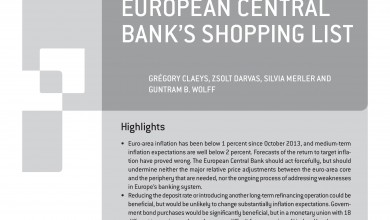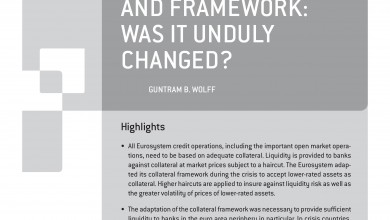This op-ed was originally published in the Handelsblatt, Nikkei Veritas and Nikkei Asian Review and Linkiesta.
The ECB is often criticised for its low interest rate policy – especially in Germany, where this is felt to be an attack on savers. However, this argument fails to recognise that real interest rates have been falling since the 1980s. I argue that it is time for politics to act with reforms and deficit funded investments, including in refugees.
The reasons for this are the subject of heated debate, but the fact is that there have been long-term changes in global savings and investments due to demographic and structural factors. Monetary policy has not caused this situation, yet it has to find a response. All the same, monetary policy cannot address questions of redistribution, which fall primarily within the political domain. The ECB will have to extend its program, but politics has to deliver on long-needed structural reforms and foster growth through sensible investments, in particular regarding refugees.
The ECB was given far-reaching independence to fulfil its mandate, which is primarily to achieve an inflation target of close to, but below, 2%. With inflation rates close to zero and core inflation of just 1%, the ECB is far away from its target. Even in 2019 markets do not expect inflation to be back at 2%. Low inflation is driving up real interest rates, which are still too high in comparison to the equilibrium rate – despite an ECB policy rate of just 0.05%. As a consequence, the ECB’s monetary policy, although expansive, is actually having restrictive effects.
Especially in Germany the ECB is receiving sharp criticism for the low nominal interest rate and its QE programme. It is often argued that these policies are expropriating savers. For savers, however, the real interest rate is the relevant variable, and this has actually risen recently due to declining inflation. Nevertheless it is true that savers have been afflicted by declining long-term interest rates. While the real return on 10-year German government bonds was well above 4% in the 1980s and 1990s, it decreased to 2.5% in the 2000s, and has at average been languishing at 0.4% since 2010.
Since insurance companies and other financial service providers often bind their products to nominal interest rates, this has been creating tensions for some time. However, in their strident demands for an end to the ECB’s low interest rate policy, they fail to recognise that the ECB cannot take account of redistributional questions. It simply has to fulfil its mandate. Moreover, higher ECB rates would be even more harmful for these very institutions. An increase in ECB rates would worsen the recession and drive inflation down even further, which in turn would result in lower nominal long-term interest rates.
In such a situation, one should criticise politics – not the ECB. Do real interest rates need to fall even further to equilibrate saving and investment? Or should the government respond to this development with structural and fiscal measures?
My analysis is that politics has to provide better investment opportunities in the euro area and also in Germany. This means improving the business environment and certainty for long-term planning, as well as deepening the European single market.
With regard to Germany, the often-criticised current account surplus of almost 9% of GDP shows that it is especially German companies that invest too little at home. Fundamentally, this shows how poor the conditions for investment are in Germany. For example, politics needs to reduce protectionism in the service sector, welcome structural change towards new technologies, and ensure that investors can make firm long-term plans regarding the German energy transition and climate policy.
In addition, Germany should increase public investment. The major need for investment has just been mentioned.
The acute shock caused by the inflow of refugees should be used as an opportunity to meet the demand for housing, education, infrastructure etc. with reasonable and forward-looking government spending. Since these are temporary expenditures which will, according to independent estimates, be followed by higher public revenues in the near future, they should be financed through deficit spending. This would support the German economy and reduce redistributive conflicts.
Smart integration of refugees into the German and European economies coupled with deficit-financed investments would eventually also help to increase the structural real interest rate. This would support the ECB in fulfilling its mandate and would therefore make an extension of the QE programme less likely. In the end, such a package of comprehensive measures would be the best way to ensure that both insurers and savers see real interest rates rise, while German companies regain interest in investing at home.


